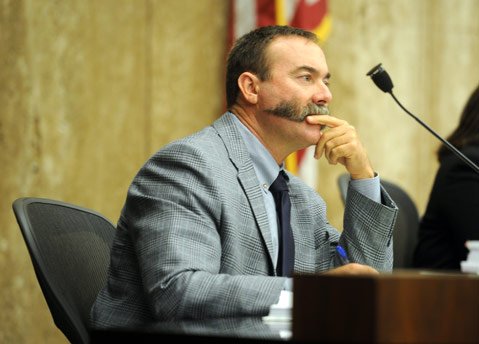Maintenance Ordinance Dead on Arrival?
County Finance Boss Says Peter Adam's Ballot Initiative May Not Be Possible

Supervisor Peter Adam’s ballot initiative to prioritize funding for the upkeep of county-owned roads, buildings, and parks took a wallop this week from County Auditor-Controller Bob Geis, whose fiscal impact statement on the measure said it could spell doom for county finances — and possibly be infeasible. The extra $18 million-$21 million annually that Public Works has said it would be needed to preserve the condition of the aforementioned facilities would — without new revenue — “result in a major reallocation of county resources away from services they currently support,” including public safety and health and human services. Further, Geis wrote, funding for such programs is prescribed by law, meaning that “it may not be possible for the Board of Supervisors to fund the requirements of the ordinance.”
To be put before voters on June 3, Adam’s maintenance ordinance — which happened to draw the title of Measure M from the elections office, which Adam called “divinely fortuitous nomenclature” — would require the supervisors to hold the facilities to their existing levels or better, so as not to add the costs to the county’s $300 million-and-growing deferred maintenance backlog. The county couldn’t take on debt to foot the bill, unless voters give their okay.
Geis’s statement, submitted to the elections office on February 28, said how the supervisors deal with the ordinance, if passed, would depend on how they decide to measure the standards, how they can balance the required funding against other needs, and “the extent to which the ordinance is valid under state law.” (County counsel will submit an impartial legal analysis for the ballot on March 10.) Finding other sources of revenue would be the key to minimizing the ordinance’s effects on money for other services. Voter-approved parcel taxes, general obligation bonds, and infrastructure improvement bonds could work, Geis wrote. Increasing the county’s hotel bed tax — the supervisors recently re-floated the idea to increase its 10 percent tax to 12, to match other area cities’ rates — could also work, Geis said, but to restrict the tax to infrastructure would require a two-thirds approval by the public.
“The board is still going to be in charge of where the money comes from,” Adam said. “What the initiative can do is tell them to do something. What the initiative can’t do is tell them how to do it.” With Supervisor Doreen Farr, Supervisor Salud Carbajal, who has called the measure the “anti-public safety net initiative,” will be authoring an argument against the measure for the ballot.


